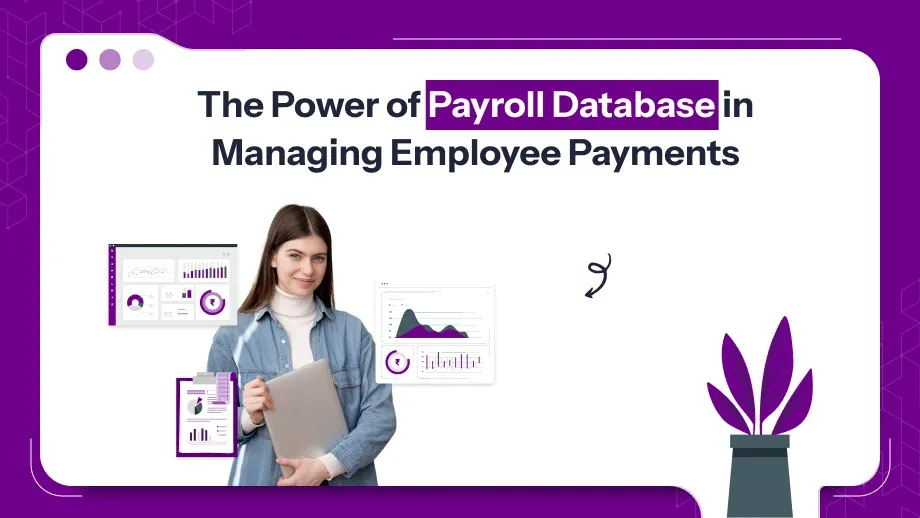
The payroll database management system has become complex. With a large staff complement and amended tax laws or taxes, businesses have to ensure that they have implemented efficient payroll systems to handle payroll evolution and taxes quickly and efficiently. The payroll database will be a godsend.
A payroll database centralizes all the information that concerns payrolls. These include salaries, employee benefits, tax deductions, and attendance records. In doing so, it automates the storage of data and reduces payroll processing by avoiding the risk of errors. In this manner, it allows companies to adhere to tax laws and labor legislation.
A payroll database is a central repository where all payroll-related data, including employee compensation, tax information, and deductions, are stored securely and organized. It helps streamline the payroll process, enhances accuracy, and ensures compliance with relevant laws and regulations.
What is a Payroll Database?
A payroll database is the system that has been designed to store, manage, and process all payroll-related data for employees within an organization. It will include details like:
- Personal Information of the Employee: Name, Social Security number, address, etc.
- Compensation Information: Commissions, bonuses, hourly pay, and salary.
- Tax Information: State, local, and federal tax information.Retirement plans, medical coverage, and other deductions are examples of benefits and taxes.
- Participation and Working Hours: Holiday days, absences due to illness, overtime, and hours spent.Businesses can handle payroll more effectively, cut the number of errors, and stay in compliance with tax laws by storing all of this data in a single location that is readily available, secure, and solidified.
Benefits of Using a Payroll Database
Greater Accuracy and Productivity
Increase Accuracy and Efficiency There is no bigger advantage of working with a payroll database than high accuracy and high efficiency. Pooling all that payroll data would reduce the occurrences of human mistakes that usually pop up in many manual processes, and automatic deductive calculations automatically mean that every check is right as well as comes on time on every cycle for every employee.
Consolidated Compliance Administration
An intensive management of compliance with the local, state, and federal tax laws is ongoing since things keep changing. A payroll database helps keep track of the tax requirements by automatically calculating the deductions, producing tax forms, and making sure that all filings would be kept accurate and up to date.Moreover, an organized database will keep all the records of employees up-to-date and available so that responding to an audit or tax authority’s request becomes easy.
Better Data Security
A payroll management system database provides a safer space to accommodate sensitive employee details. Proper and robust encryption can protect the companies’ payroll database from cyber breaches and unauthorized usage. Paper systems are vulnerable and may be susceptible to loss, theft, as opposed to being lost or being stolen, such as in cases of paper work, a computerized payroll system will have multiple layers of user access controls combined with audit trail.
Easier Reporting and Analytics
With a payroll database, business owners and HR experts can obtain detailed reports on cost of payroll, employee compensation, and other necessary metrics. These reports may encompass overtime hours worked, benefits consumed, or even tax reports that can be derived from the system. This kind of database for payroll management system can automatically update these reports without wasting precious hours, giving businesses real-time access to information for strategic decision-making purposes.
Improved Employee Self-Service
In modern payroll databases, various features of employee self-service enable an employee to access their pay stubs and other tax documents or benefits information anytime from anywhere. That saves the administrative burden of any HR department.
Streamline your payroll process with a secure payroll database.
Get started today and ensure compliance with ease!
How to Establish a Payroll Database in Your Business?
Creating a payroll database is easy. It involves so much planning, however. Follow the following guidelines for the initiation of this service.
Evaluate Your Needs
The first step would be to analyze your company’s requirements. What size is your business? How many employees are you going to be managing? Which features will you need in this database? Do you require it to interface with existing HR software, or will you need some advanced reporting?
Making sure that the system will work with your business size, industry requirement, and budget is the most important thing while making a decision. The top three payroll software systems are ADP, Gusto, and Paychex. It should also be scalable, so it is able to grow with your business and meet all of your compliance requirements.
Select the Right Payroll Software
There are many payroll software solutions that have an integrated payroll database. In making a choice, consider the system that will work for your business size, industry requirements, and budget. The most popular payroll software options are ADP, Gusto, and Paychex. Ensure that the system is scalable to grow with your business and meets all compliance requirements.
Migrate Existing Data
If you are coming from a manual system or another software solution, you should migrate your existing payroll data into the new database. This could include importing employee details, pay rates, tax information, and historical payroll records. Most payroll software providers offer data migration support to ensure a smooth transition.
Train Your Team
With a payroll database set up, training your HR and finance teams will be important so that they learn how to put data into the system, print reports, and keep the system in compliance with ever-changing tax laws.
Regular Backups and Updates
Regularly back up your payroll data to maintain the security and efficiency of your payroll database, and update your payroll software periodically to use its latest features while maintaining data integrity.
Benefits of a Payroll Database
Accuracy and Efficiency
Automating payroll with the use of a database ensures that payroll calculations are both accurate and efficient. The system minimizes human error in payroll computation through a shift away from manual computations and spreadsheets, ensuring employees are paid correctly and on time.
Enhanced Compliance
It is indeed a challenge to track the constant changes in tax laws, labor regulations, and employee benefits for a business. Payroll database is the feature that helps ensure compliance through automatic calculations of deductions, tax reports generation, and tracking of employees’ earnings and deductions. This aspect drastically reduces the chances of a compliance violation, audit, or penalty.
Time Saving
A payroll database simplifies the whole payroll process from employee data management to tax reporting. The business will save hours of work by automating tedious payroll calculations, data entry, and reporting that would otherwise have been spent on other critical HR and business functions.
Scalability
Payroll management gets more complicated as your company expands, as does the number of workers. Because of its adaptability, the payroll database can expand along with your business’s growth.. The system can easily handle more employees, different compensation structures, and a variety of deductions and benefits without compromising performance or accuracy.
Better Decision-Making
Using a database payroll system will enable businesses to compute and report comprehensive details on payroll cost, trends, and compensation patterns. These reports would be very useful to leadership in terms of budgetary decision-making, employee retention, and compensation planning.
How to Choose the Right Database Payroll System?
When selecting a database payroll system for your business, consider the following factors:
Size of Your Business
Select an answer that can manage the number of employees you now have and grow with them. While certain systems are made to assist large organizations with complicated payroll requirements, others are more appropriate for small firms.
Features and Customization
Seek out an arrangement that will satisfy your unique payroll needs, such as timekeeping, reporting, tax compliance, and employee benefits administration. The system require flexibility to your business’s specific needs.
Ease of Use
The system should be user-friendly and easy to navigate. A complicated system may require extensive training for HR staff, which could slow down payroll processing and increase errors.
Integration Capabilities
Ensure the system integrates well with other HR and accounting software you use. Integration helps streamline workflows and reduces the need for duplicate data entry.
Security Features
Choose a database payroll system that provides top-notch data security, including encryption, role-based access control, and data backup options.
How Payroll Databases Ensure Compliance?
Ensuring compliance with tax laws and labor regulations is one of the key challenges for businesses. Maintaining compliance occurs through a payroll database in automating the processes and computations that would otherwise call for manual intervention.
Accurate Tax Calculations and Withholdings
One of the hallmark areas where payroll databases excels is in calculating taxes. Tax laws sometimes are indeed even more complicated, and these change on the federal, state, and local levels. Through an update with the latest tax rates, payroll databases assure that the right amount of withholding can be done from the employees’ pay. The system automatically computes:
- Federal income tax based on tax brackets.
- State and local taxes based on jurisdiction.
- FICA taxes or Social Security and Medicare.
- Unemployment insurance and other mandatory deductions.
- This automation ensures accurate tax withholding and reduces the risk of tax errors, which can lead to audits or penalties.
Tracking Leave and Benefits Compliance
A payroll database tracks employee leave, such as vacation, sick days, or parental leave, ensuring compliance with labor laws like the Family and Medical Leave Act (FMLA). The database can automatically adjust payroll check based on time taken off when tracking accrued leave, which helps ensure that employees are paid correctly and that businesses comply with leave entitlements.
In addition, it deals with the benefits like health insurance, retirement plans, and other employee benefits.The system can calculate contributions from the employee and employer matching to ensure all benefits are correctly processed.
Generation of Tax Forms and Reports
The production of forms for taxes required by government organizations and employees is streamlined by a payroll database. It will automatically create W-2 forms for employees with salaries or 1099 forms for contractors at the end of the year. In addition, the system may provide annual and quarterly tax reports, assisting with guaranteeing businesses meet filing obligations.
By offering accurate and timely reports, the database reduces the possibility of fines for late or inaccurate submissions, helping companies maintain adherence to tax regulations.
Auditing and Record-Keeping
Maintaining payroll records is necessary in case of audit and internal check. A payroll database stores all detailed payroll transactions, such as payroll salary payments, bonuses, and deductions with respective taxes. Thus, this would ensure an audit trail for the companies during both internal and external audits. This enables businesses to gain access to such information during any regulatory scrutiny.
Best Practices for the Security of Payroll Data
Payroll databases are equipped with advanced security capabilities, but for businesses, security and confidentiality measures must be exercised through best practices. Here are some key recommendations:
Frequent patching and software updates
Cybercriminals usually employ software flaws to get unauthorized access to sensitive data. Avoiding these holes is made easier by keeping the payroll management system database software current with the most current security fixes. Update all installed software, including databases, payroll apps, and computer operating systems, with the latest and most recent security updates.
Employee Training on Data Security
Even the most secure payroll system can be compromised through human error. Train employees, especially those who have access to payroll data, on proper data security practices.Educate employees on appropriate data security procedures, particularly those who have possession of payroll data. This covers identifying phishing attempts, creating safe passwords, and reporting questionable activities.
To avoid unintentional access employees should also be instructed on how to safely dispose of private data and lock their desks while not in usage.
Secure Physical Access
In addition to the above, business houses need to provide physical security to devices and servers holding payroll data. For instance, the servers must be stored in a safe data center, and the payroll information accessed from safe devices only by the employees.
Use of Firewalls and Anti-Virus Software
Anti-virus programs and routers serve as defenses against illegal access and cyberattacks. These methods guarantee that payroll databases are protected from outside threats like malware, ransomware, and attempts at hacking.
Conclusion
A payroll database serves as an absolute requirement for companies to manage complex payroll processes in the most efficient manner possible. Centralization of data on the employee’s salaries, tax deductions, benefits, and attendance automates the payroll calculation process, reduces the chances of human error, and also ensures compliance with changes in tax laws and labor regulations. This automatically saves time, which also assures timely and correct payments to the employees, therefore ensuring a more productive workplace.Further, a payroll database helps ensure data security by protecting sensitive information and providing audit trails for compliance.






